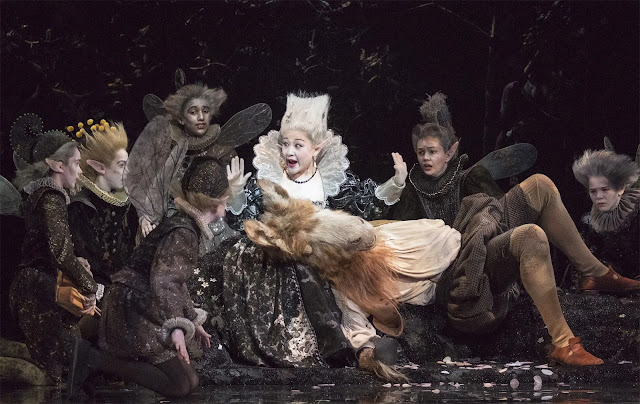·
Something
dreamy/ vague in the topic itself
·
Midsummer
is the time for fertility/May rituals
·
Time
of magic – Summer solstices - May 21
Approximate year of performance 1595
– might have been written a little earlier
·
After
Romeo and Juliet and before The Merchant of Venice
·
Some
call it a comedy – one of the earliest examples of Magical realism
·
But
feminist, Marxist, and postcolonial readers may think otherwise
·
Very
hard to slot the play – whose side the dramatist is on is never clear – a good
quality
What is the socio-political
significance of the year of its performance?
·
Elizabeth
I 1533-1603 - the Virgin Queen – her unwillingness to bow down to patriarchy
and Protestant concepts on the place of woman problematic
·
The
queen was aging and without a heir – succession – conspiracies
A lot of couples:
Socially
accepted
·
Ruling
couple – Hippolyta and Theseus
·
Aristocratic
couples
o
Hermia
and Lysander
o
Helena
and Demetrius
·
Fairy
couple – Titania and Oberon
·
Couple
in the Mechanical’s drama Pyramus and
Thesebe
Antisocial/
asocial
·
Moon
goddess and women
·
Hippolyta
and the Amazons
·
Hermia
and Helena
·
Titania
and Her Indian Votaress – impregnated and dies in child birth – Does this scare
Titania? Is it why she picks up a quarrel with her husband?
·
Titania
and the Changeling boy
·
Bottom
and Titania
Everybody
gravitates towards the forest – a
space outside civilization in which one can resolve problems imposed by
civilization and return
Themes:
1. Transformation – everything becomes
something else sometimes several times – transitional time in history – plastic
nature of the period
2. Taming of matriarchy
·
Hippolyta
is the Amazon queen captured by Theseus – still not fully ready to accept her
role as being subservient to her husband – her first speech and the last speech
·
What
is happening to Titania is for her benefit – she is warned to rein in her
sexuality and respect her lord and master’s wishes – if not she would be
humiliated in the same way
·
All
female associations are dissolved in favour of male-female relationships
i.
Helena-
Hermia
ii.
Titania-
Indian Votaress
3. Taming of female sexuality – brought under
patriarchal rule supervised by Protestant ethics
·
Hippolyta
– already defeated and made monogamous
·
Helena
– father threatens to kill her
·
Hermia
– Demetrius threatens to kill her
·
Titania
– Oberon humiliates her by making her fall in love with an ass-headed man – her
lust for Bottom is taken as a reference to the repressed sexuality of Elizabeth
– it would result in something unnatural – it is not natural for a woman to be
celibate – the woman’s role a wife/mother
4. Female property rights
·
Hippolyta
loses her kingdom (and her magical girdle, too)
·
Titania
– the changeling boy
·
All
women loses their sovereignty to the men in their lives
5. Colonial project
·
The
Changeling – metaphor for the seductive dark-skinned east – the Other
·
The
orient is sexualized/ feminized – Edward Said, Homi Babha – something to be
possessed by the masculine west
Characters:
·
Puck
– cupid/a mischievous country spirit – Ariel in The Tempest
i.
An
agent of patriarchy (?)
ii.
What
can you interpret form his ‘mistakes’ of his character? Is he fully assimilated
to the modern order?
·
Bottom
– a satyr – wild sexuality


.jpg)


No comments:
Post a Comment